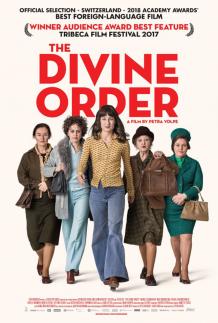If it’s startling that the 19th Amendment, which enshrined women’s voting rights across the United States, is less than 100 years old, “The Divine Order” is set in Switzerland, where the equivalent constitutional amendment — establishing the right for women to vote at the federal level — didn’t pass until 1971. “The Divine Order” examines that fight for women’s suffrage in a microcosm. Directed by Petra Volpe, the film is set in a conservative Swiss town that has gone largely insulated from the spirit of the swinging ’60s. (To judge from the film’s grayish look, the locality has even escaped the decade’s tie-dyed palette.) The movie centers on Nora (Marie Leuenberger), who, like most of the town’s women, has been cowed into keeping her opinions to herself. “The more we push, the more the men do what they want,” she tells a pamphleteer encouraging approval of the referendum. Nora’s days consist of caring for her children, indulging her proudly retrograde father-in-law and yearning to take a job that would break the monotony. If Nora’s name weren’t enough of a nod to Ibsen, her husband, Hans (Max Simonischek), addresses her as “my little bird.” But soon Nora is moved to act. Nora’s rebellious teenage niece (Ella Rumpf) is sent to reform school and then, after she runs away, to prison. Nora reads up on the inequities of Swiss marriage law. A small act of defiance against the town’s leading female anti-suffrage finger-wagger (Therese Affolter) wins her an ally in a feisty widow (Sibylle Brunner), and soon an Italian restaurant owner (Marta Zoffoli) joins them. Their growing movement culminates in a strike that brings the town to a halt. Taking a middlebrow, mildly rollicking approach to a serious subject, “The Divine Order” doesn’t exactly break new ground. It goes for easy laughs, like a scene in which the women attend a workshop led by a Swedish guru who teaches them a better appreciation of their anatomy. The composer, Annette Focks, supplies an array of insistent Spielbergian music cues, and the film hinges on a pair of big-speech scenes. Still, “The Divine Order” effectively illustrates how peer pressure can influence the political process. Collective silence, whether it’s from women unwilling to publicly press for their rights or men afraid to voice agreement with their wives for fear of looking weak around co-workers, proves more of an obstacle than any opponent. That message gives Ms. Volpe’s lark a timely edge. Courtesy: Ben Kenigsberg, New York Times
The Divine Order
WINNER - Audience Award Best Feature, Tribeca Film Festival 2017
Virtual cinema:
Showtimes:
No screenings currently scheduled.

Directed by:
Petra Biondina Volpe
Running Time:
100
Country(ies):
Switzerland
Year:
2017
Language:
Swiss, German, and Italian with English subtitles Starring:
Marie Leuenberger, Max Simonischek, Rachel Braunschweig, Sibylle Brunner, Marta Zoffoli, Bettina Stucky
Official site:
Link Screenplay by:
Petra Biondina Volpe
Rated:
14A


